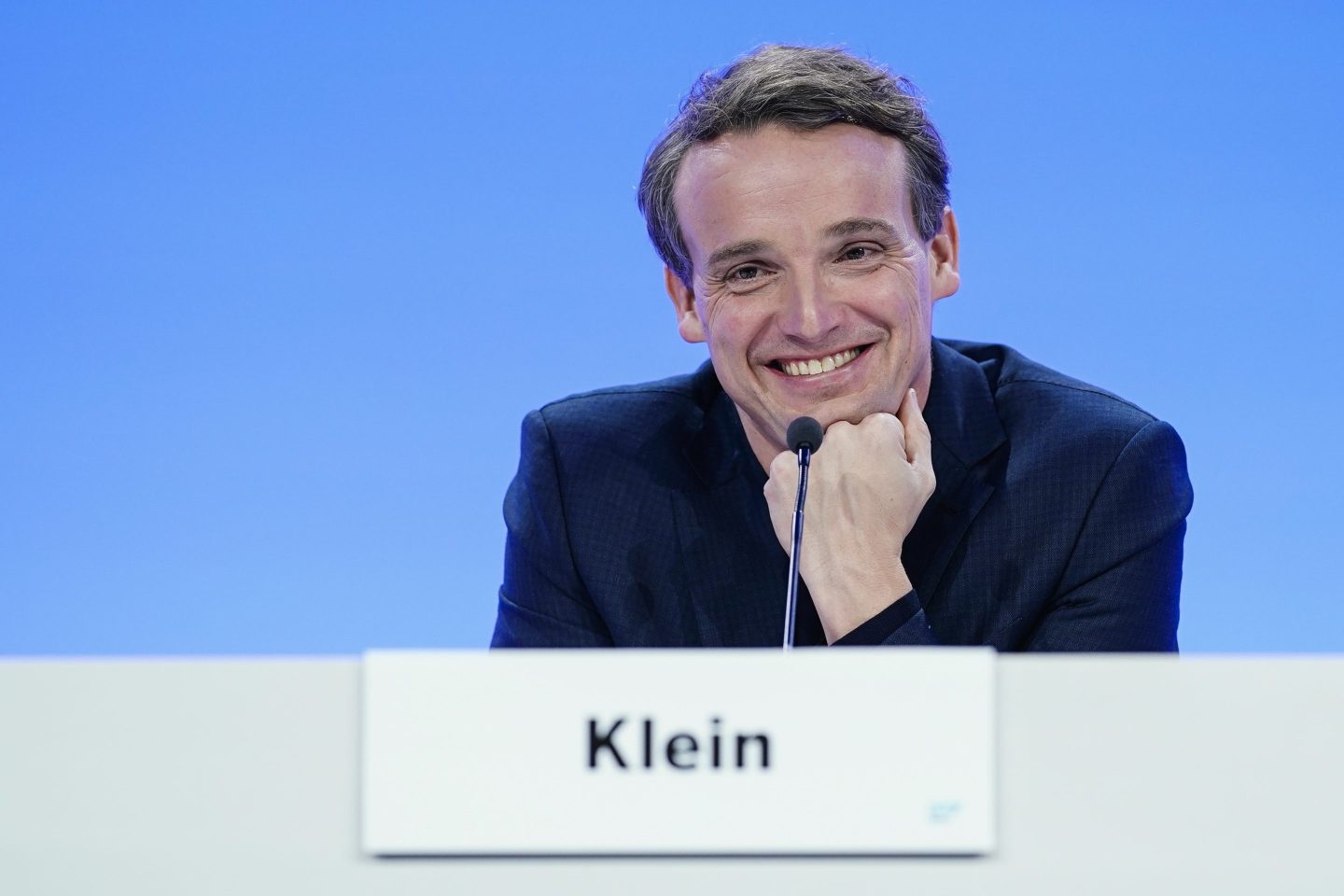Good morning from Geneva.
For everything to stay the same, everything must change, Giuseppe Tomasi di Lampedusa, author of The Leopard, wrote in 1956. Almost 70 years later, Christian Klein, the CEO of Europe’s only tech giant, SAP, has a similar view on the recipe needed to revive the European economy.
European companies must change to remain competitive. National governments such as Germany’s must change to maintain their prosperity. And the European Union itself must change and fully integrate for the bloc to keep its independence vis a vis the U.S. and China.
I spoke with Klein, who at 39 was the youngest CEO of a DAX company when he was appointed in 2019, during last week’s World Economic Forum. Here are a few of his insights:
On why and how companies must adopt AI:
“You can buy AI from Microsoft, Google, or Amazon, but it will not lead to the outcomes you expect if you treat it as a piece of technology. You have to do change management and invest in your employees…At SAP, 20,000 people are part of an AI development rollout in 2024.”
“AI will impact all kinds of functions: coding can be done by generative AI…AI can put together good [sales] content, tell you which content works best for which client…AI can make a preselection for HR in hiring…and in accounting, generative AI can help to check contracts. It is real. It is happening.”
On the role of European integration for European businesses:
“We lack pragmatism and empowerment at the European Union level…We need in Europe a true digital union. We now build separate products for France, Germany, and any other market. But startups cannot do that. So we need to give more empowerment to Europe…and complete the union.”
On the need for reforms in Germany, Europe’s largest economy:
“In Germany, there is a digital minister, but he doesn’t have a lot to say. You have several different states making their own decision and choosing often the conservative side…We need to fundamentally rethink our constitution, give up certain responsibilities, and put this power [with] a digital ministry.”
“There is an awareness that Germany has to do much better…Our economy is not working anymore. Companies from outside of Europe are disrupting us…So it is now time to change…With your back to the wall, you need to realize, it doesn’t help me to stick with the status quo.”
On the interplay of democracy and capitalism:
“I still hope that…the overwhelming majority of the people still also appreciate the way we live: in a democracy, but also that we sustain it with economic success. So we need to bundle power and come together. If not, then we are in deep trouble.”
Klein is an expert on change management, by the way. When he took over SAP, he realized the company had to be fully cloud-based, which it wasn’t yet. But he also knew that would come with short-term pains, including a multibillion euro drop in revenue and the shedding of jobs.
(There is more change on the way. SAP on Tuesday—days after I spoke with Klein—announced the restructuring of 8,000 jobs to better orient itself toward AI.)
“What you need for that is courage,” he said, referring to SAP’s earlier cloud pivot. “During our own transformation, our share price collapsed by 30%. But I needed to accept that in order to move forward. I saw the need to take a hit to focus on the mid- and long-term. It is similar to what many other companies are facing today.”
The result? SAP’s share price today is at an all-time high, and SAP remains Europe’s largest tech company.
More news below.
Peter Vanham
peter.vanham@fortune.com
@petervanham
TOP NEWS
BASF slumps
German chemical giant BASF's income fell to €3.8 billion ($4.1 billion) before interest and tax last year, a 45% drop due to slumping demand and higher energy costs. The company also plans to shrink its plant in Ludwigshafen in a pivot towards its China operations. Markus Kameith, BASF’s current head for Asia, takes over as CEO in April. Bloomberg
A cyberattack on history
The British Library’s computer systems are still not fully functional three months after a crippling ransomware attack. Roly Keating, the head of the museum and a former BBC executive, says his first decision was refusing to pay the £600,000 ($762,000) ransom to the hackers: “It is just basic practice that you don’t pay money to criminal blackmailers.” The museum is likely to pay ten times that amount to fully restore its digital services. Financial Times
Meta falls in line
Meta will start actively prompting users whether they want to delink their Facebook and Instagram accounts—but only in Europe. The social media company’s decision comes months before Europe’s new antitrust law, the Digital Markets Act, takes effect. In a post on the company’s website, Tim Lamb, Meta’s competition and regulatory director, said it supports the DMA’s promotion of “contestability and fairness in digital markets.” Fortune
AROUND THE WATERCOOLER
How Croatia’s first unicorn grew from a small village with a $16,000 loan from parents to a billion-dollar tech powerhouse working with WhatsApp and Uber by Prarthana Prakash
Zelensky urges Davos to take $300 billion of Russian Central Bank money and help Ukraine war effort: ‘Putin loves money above all’ by the Associated Press
Cartier-owner Richemont’s earnings may show the bright spot that luxury companies have been waiting for—demand from Chinese shoppers by Prarthana Prakash
Denmark’s monarchy shake-up takes a fresh twist as King Frederik X publishes a surprise book 3 days after taking the throne by Prarthana Prakash
This edition of CEO Weekly Europe was curated by Nicholas Gordon.
This is the web version of Fortune CEO Weekly Europe, a newsletter on the companies and industry leaders shaping every facet of business in Europe. Sign up for free.













